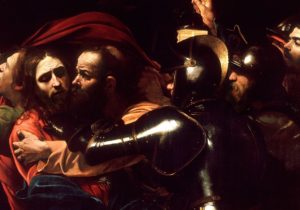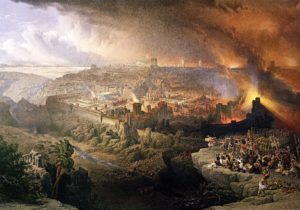Alonzo McDonald died on November 21, 2019, in Naples, Florida. He was 91—which is curious, for that number probably corresponds with his measure on the Richter scale. Al was a force. I doubt anyone who ever met him came away unimpressed by his sheer magnitude. Happily, he was a godly force, so his magnitude was matched by his magnanimity. Among much else, he was a leader, patriot—partially exhibited by a stint in the Marines—a tenacious journalist, businessman, White House staff director, defender of religious freedom, advocate for justice, an impactful benefactor, and, always, a family man.
His philanthropy was born of his recommitment to Christ in his early fifties. Having set aside his childhood faith, Al’s gods became, he said, “increasingly the secular ones of money, recognition, and power.” He was good at it and climbed the full height of innumerable ladders in business, government, and academia. Having done so, however, he could now “see over the proverbial walls these three ladders leaned against.” And “he didn’t like what he saw on the other side of any of them.” This discontent led Al back to questions about God.
In time, having come again home again, Al turned his energies to Christian philanthropy. He co-founded the Trinity Forum, which helps leaders engage with questions of faith and morality through great literature. And he founded and directed The McDonald Agape Foundation, which encourages distinguished scholars for Christ at top universities, endows theological professorships and educational centers, and much else.
Last week, at Christ Church Cathedral in Oxford, a group of Al’s friends came together to memorialize him. Reverend N.T. Wright gave an obituary sermon that captures Al’s tremendous spirit. Because Al’s life and vision parallel Providence‘s aim to prove the power of the Hebraic tradition to explain reality and promote human flourishing in every sphere of life, both private and public, it is fitting to share Wright’s wonderful essay with you. May it inspire you.
We thank God for Al McDonald. May his memory be for a blessing.
Marc LiVecche, McDonald Research Scholar, McDonald Centre for Theology, Ethics, and Public Life, Christ Church College, Oxford. Editor at Large, Providence.
The last time I had to preach at a memorial service I cheated. The occasion was honoring Asa Briggs, Lord Briggs the great historian, with whom I had worked when he was provost of Worcester College and I was chaplain. Asa had the great advantage of sharing his name with a biblical character with remarkably similar achievements: Good King Asa resonated through from the tenth century BC to the twentieth century AD. But I have searched high and low in scripture, wanting to express my great appreciation to the McDonald family for entrusting me with today’s responsibility as well as my appreciation for Al McDonald himself, and the Bible just doesn’t seem to have either a king, or a priest, or a prophet called Al. Especially not Alonzo.
No matter: another model lies ready to hand, even with another name. The more I have thought about Al’s life, character, and achievements, the more the biblical figure of Nehemiah has come to mind. Nehemiah was among the exiled community of Judaeans in Babylon in the fifth century BC. He was a layman who had risen to prominence in the Babylonian court. But he heard that all was not well with the first wave of exiles who had returned to Jerusalem. The city was in bad shape, and its enemies—those who hadn’t wanted the Judaeans to return—were happy to keep it that way. How easy it would have been for Nehemiah to accept that as the status quo, to shrug his shoulders and get on with a high-profile and no doubt influential career in the court of Babylon. But Nehemiah wasn’t content with that. The opening of the book, of which we just heard a part, tells how he did three things. He prayed; he organized; he got the job started. I love that vivid touch of Nehemiah getting up in the night to ride around the city and note what had to be done, then presenting the priests, the nobles, the officials, and the rest with a task list. And when some people laughed and said it couldn’t be done, or perhaps that it shouldn’t be done, he calmly announced that the work was going ahead. And through the trials and problems ahead, it was Nehemiah’s steely and faithful leadership that got it going and turned the whole thing around.
I recall, many years ago, one Old Testament scholar speculating that the reason why Ezra isn’t mentioned much in the book of Nehemiah and why Nehemiah is barely noted in the book of Ezra, even though they worked on common projects at the same time, may be because Ezra the priest may not entirely have enjoyed having this energetic and very capable layman leading the way, being appointed governor, establishing security, lavishing generosity in all directions, thwarting counter-plots, initiating reforms, and generally getting things done. (The text doesn’t actually say that people likened Nehemiah to a crocodile, but it doesn’t say they didn’t, either.) Be that as it may, the key moment for me in the passage we read is when Nehemiah, having surveyed what needed to be done, tells the Judaean leaders that both God and the king are onside with all this, and they say, “Let us start building!” “So,” writes Nehemiah himself, “they committed themselves to the common good.”
Far be it from me to overplay this particular hand, but you see the point I’m making. Here is someone of great administrative gifts who can see that things are sliding in the wrong direction, and that the community of the people of God badly need to get cracking on rebuilding and on various other reforms. He says his prayers; he talks to the key people; he goes to see for himself what’s going on; he lays out his plans; he scorns the doubters and nay-sayers; he gives generously from his own resources; and the job goes ahead. Does that or does that not sound like our late, great friend?
I am particularly interested in the way Al McDonald was directly responsible for regeneration in some of our great universities. Obviously, the fact that we’re here in Christ Church tells its own story, because the McDonald Agape Foundation is now written into the history of this place too, and the impact of Al’s benefactions in London is likewise stunning and will continue to be so. But I came in on the ground floor over 20 years ago at Harvard. I was lecturing as a guest and the then dean called me in and told me of this strange plan for a Visiting Chair in Evangelical Theology. To think of such a thing at Harvard Divinity School sounded rather like proposing a Visiting Chair in Punk Rock for the Oxford Music Faculty. (Maybe there is now such a thing, but it seems unlikely.) I expressed concern: I knew, I said, what the word evangelical meant in the United States, and I didn’t think the word fitted me. (I should say that the word has gone through various subsequent, and to me unwelcome, further developments, but that’s another story.) The dean laughed: “Oh,” he said, “from the perspective of Harvard Divinity School you’re an evangelical all right.” Then he and one or two others explained. From Al McDonald’s perspective, the word evangelical didn’t mean strict adherence either to Jerry Falwell or Billy Graham or even John Stott. It meant “people who believe all the stuff”—in other words, people who believe in God, in Jesus, in the resurrection, in the life-changing power of the Holy Spirit. From Al’s point of view—and he proved this by his own late-in-life crossing of the Tiber—you could be an evangelical in this sense and be a Roman Catholic, a Greek Orthodox, or even, as in my case, an Anglican.
So I went to Harvard as Al’s guest, as it were, in the autumn of 1999, and taught a couple of courses. And it was clear that the equivalents of Sanballat the Horonite and Tobiah the Ammonite were watching from the wings, horrified that such a chair should sully their beloved liberal institution. But Al, like Nehemiah, was quite unfazed by this. He knew what he was doing; he had the dean onside; and the project went ahead. You see, the fascinating thing here is that many American benefactors with Al’s personal Christian commitment and theological beliefs would never have thought of Harvard. They would have propped up one of the well-known explicitly evangelical colleges, or even founded their own. But Al, with all his background training, was thinking strategically. Harvard, Yale, Oxford, London—these places are going to go on being important. Let’s transform them from within. And the proof of the pudding in Harvard at least is that—and this would have been unthinkable 20 years ago—when the McDonald chair eventually became a full-time post, they appointed someone who quickly won the confidence of the whole faculty and is now its respected leader and dean. That can’t be easy, by the way, but it is what happens when shrewd and capable laypeople say their prayers, suss out the situation, figure out what needs to be done, and persuade the key people to say, “Let us start building!”
I have noted this one example, but we all know of others. My wife and I much enjoyed our various meetings with the Trinity Forum, and I recall several other engagements, including two at Duke, the second being just a few weeks before Al left us for good. And in each case there has been a sense that Al, and those around him in the family and close advisors, were thinking strategically. This has never been a matter of doing a one-off just to ginger things up for a moment. This is about changing the culture, about injecting at a basic level fresh thinking, writing, and teaching that will reset the norms in various disciplines for generations to come. That takes Nehemiah-like doggedness, prayerfulness, generosity, and administrative savvy, and we thank God that Al had all those in abundance.
Let’s put all this on the map of the New Testament Gospel, as sketched by St. Paul in our second reading. (Perhaps I should say, for those with ears to hear, that I belong to that old Oxford school that regards the prejudice against Ephesians as the sad smile on the face of the disappearing Cheshire Cat—the Cat in question on the face of a nineteenth-century Liberal Protestant Cheshire Cat.) The passage sums up the state of humankind—all humankind—apart from the grace and love of God, then the lavish generosity of God enacted in the death and resurrection of Jesus, and the results for all who believe. The last three verses sum it all up, but at the crucial point the heavy-handed debates of recent centuries have obscured what remains a key point. “By grace you have been saved through faith,” Paul writes—and Al McDonald would have said an enthusiastic “Amen,” as we see by the hymns chosen for this service. And “it is the gift of God—not the result of works, so that no one may boast.” Fine, but this can then lead us to think that “works” simply means “keeping the moral law,” as though one could save oneself by good behavior. And that then leads us to misread the final verse, in which Paul insists, “We are what he has made us”—a rather lame translation of a vivid phrase that really means, “We are God’s handiwork, God’s artwork.” And we are, Paul says, “created in Christ Jesus for good works which God prepared beforehand to be our way of life.” It’s then easy to read this as simply an encouragement to an overall Christian and moral lifestyle.
But the phrase good works in Paul’s day, and in the world of cities like Ephesus, meant much, much more than simply behaving yourself, keeping your nose clean. Good works meant active generosity, contributing to public projects, doing what you could to make the city and the community an altogether better place. The same phrase occurs in First Timothy, with the exhortation to those who happen to be rich to be “rich in good works,” and then elsewhere, including Titus 2:14, where God’s people are to be “zealous for good works.” This has little to do with being zealous for adhering to a code of moral conduct—that is taken care of earlier in the passage—and everything to do with the urgent imperative in the early church to make sure that the followers of Jesus were known for contributing wherever they could to the upbuilding and betterment of the whole larger society. “Do good to all,” instructs Paul in Galatians, “and especially to the household of faith.”
Reflect on this for a moment as we thank God that Al McDonald at least saw this obligation very clearly. Western Christianity has been a bit battered over recent generations, and has sometimes colluded with the myth that we are a remnant in retreat before the unstoppable tide of secularism. As with Nehemiah, we hear Sanballat the Horonite and Tobiah the Ammonite mocking and ridiculing. But it’s time, with writers like the historian Tom Holland, to say no. The Christian faith has brought great blessings to the world, and it was always part of the divine plan that this should be so. We are God’s artwork, created to reflect his goodness and generosity, not simply within the holy huddle of the faithful but to the world around. I like to think that St. Paul would look at Al McDonald’s many benefactions and say, “Yes! You were created in Christ Jesus for exactly those good works; God prepared you and trained you and gave you the skills and vision and sheer cussed unstoppability with which to say, ‘Come, let’s rebuild.’ God gave you the desire to pray, to trust him not only for your salvation but for the many good works which you have been able to do, which have left a lasting mark on many people and many institutions.”
And Al would be the first to say—unless St. Paul got there ahead of him—that this should only be a beginning. Sanballat and Tobiah haven’t gone away. The cause of theological study, ministerial training, and particularly theology’s reach and impact on the wider world is urgent, but not everybody wants to know. Al’s example, and Paul’s teaching, should make us now look out upon the world of the 2020s and beyond, and in praying for our world, the church, and theology, we should be asking what comes next. Where are the walls still in ruins? What needs to happen for a new wave of solid and lasting work? Where are the people—perhaps young, perhaps not so young—who like Nehemiah, like Al McDonald, will say their prayers, talk to the key people, plan carefully, and then go to work? How will a new generation, tomorrow and the next day, commit themselves to the common good, and say, as please God they will, “Let us start building!” We will honor Al McDonald, and we will best thank God for his life and work, by answering that question.






 Sponsor a student for Christianity & National Security 2024
Sponsor a student for Christianity & National Security 2024